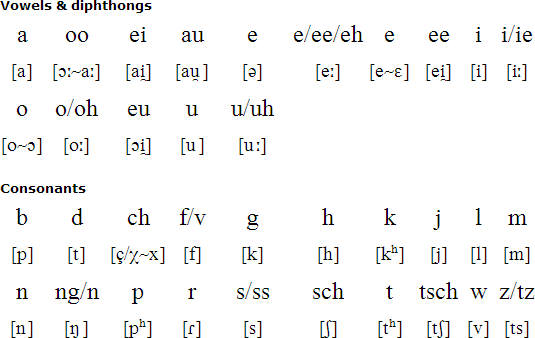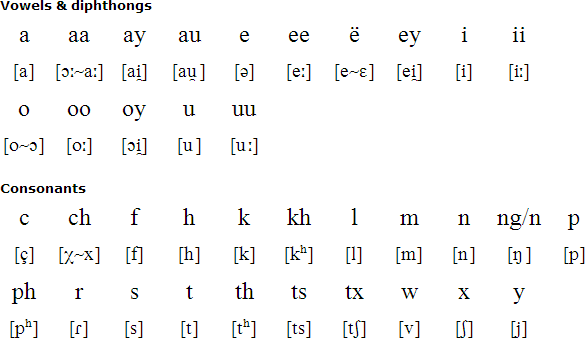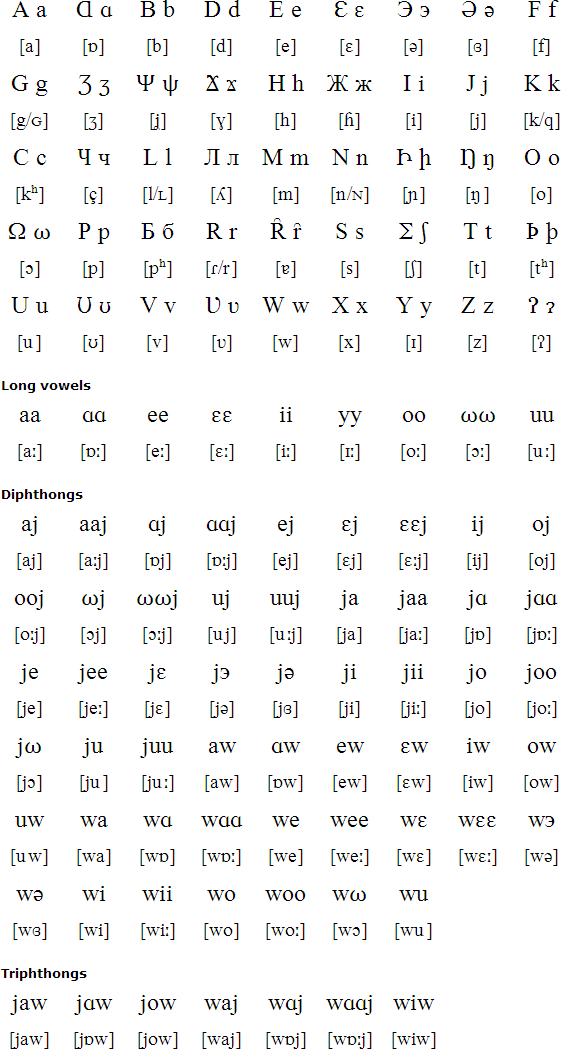Hunsrik is a West Germanic language spoken by about 3 million people in southern Brazil, especially in small villages in the western part of the states of Rio Grande do Sul, Santa Catarina and Paraná. The language is thought to have developed from the Moselle Franconian dialect group of High German, particularly the Hunsrückisch dialect, which is spoken in the Hunsrück region in western Germany. It was brought to Brazil from 1824 by German migrants.
Hunsrik has been greatly influenced by other German dialects, such as Pommersch-Platt and Plautdietsch, and also by Portuguese, and to a lesser extent by Kaingang, Guarani, Italian and Spanish. As a result it is substantially different from the Hunsrückisch dialect. It is used mainly in informal situations and in daily communication, with small regional variations.
Hunsrik is also known as Hunsriker or Rio Grande Hunsriker. In German it is known as Riograndenser Hunsrückisch German, and in Portuguese as hunsriqueano riograndense.
There are a number of ways to write Hunsrik developed by different people. One spelling system was published by Cléo V. Altenhofen and others in 2007 in Fundamentos para uma escrita do Hunsrückisch falado no Brasil, and another was published by Ursula Wiesemann in 2008 in Contribuição ao desenvolvimento de uma ortografia da língua Hunsrik falada na América do Sul.


Note: I cannot find information about the alphabetical order of these spelling systems.
More details (in Portuguese):
https://hunsriqueanoriograndense.wordpress.com/2014/03/04/uma-introducao-a-ortografia-do-hunsriqueano-riograndense-en-infeerung-zu-de-ortografie-fom-riograndense-hunsrickisch/
The Hunsrik alphabet presented below was developed by Adriano Steffler for his Gramática do Hunsriqueano and Dicionário do Hunsriqueano (both unpublished) to represent the great vowel and consonant inventory of the language precisely. The idea was to take the spelling of Hunsrik away from the Portuguese and German model, since both can represent only about half of its phonemes and sometimes even misrepresent the Hunsrik phonemes, leading to understanding and spelling problems.

Information supplied by Adriano Steffler
Download an alphabet chart for Hunsrik (Excel)
Een mool, wii ich sëks yoer alt waar, hon ich in en puuch iwich te Uer Walt, erleepte kexichte, en imprësionant pilt kesiin. Tas tsaycht en riisich jibóia xlang en wilt tier am xlike. Too is en khopii fom pilt. Tas puuch saat: “Ti riisiche jibóia xlange xlike, oone khaue, tas kefangne tier kans. Tëm noo, khëne se sich nët mer peweeche un xloofe ti sëks moonate fon te fertauung.”
Als ich sechs Jahre alt war, sah ich einmal in einem Buch über den Urwald “Erlebte Geschichten” hieß, ein prächtiges Bild. Es stellte eine Riesenschlange dar, wie si ein Wildtier verschlang. Hier ist eine Kopie der Zeichnung. In dem Buch hieß es: “ Die Boas verschlingen ihre Beute als Ganzes, ohne sie zu zerbeißen. Daraufhin können sie sich nicht mehr rühren und schlafen sechs Monate, um zu verdauen.”
Once when I was six years old I saw a magnificent picture in a book, called True Stories from Nature, about the primeval forest. It was a picture of a boa constrictor in the act of swallowing an animal. Here is a copy of the drawing. In the book it said: “Boa constrictors swallow their prey whole, without chewing it. After that they are not able to move, and they sleep through the six months that they need for digestion.
Texts provided by Wolfgang Kuhl
Ti kanzэ mɛnӡэ sɛn fraaj ʊn dэselviч in eeriчceed’ ʊn reчtэ gэpooȓ. Ti hɑn faʃtand’ ʊn gэtaŋgэ’n solэ eenэ my’m anrэ my’n kajst fωn priidȓliчceet um-keen.
All human beings are born free and equal in dignity and rights. They are endowed with reason and conscience and should act towards one another in a spirit of brotherhood.
(Article 1 of the Universal Declaration of Human Rights)
In’ən ɑɑriψэ hajzэ sωmȓ vɑɑ’n tiiʋэ sump aws-gэtrugənt, ʊn’i froӡэ vu pis tan in’əm trɛn gэvoont gэhat harэ, mustэ fa’n anȓ voon-plats hin-maϫэ. Tswɑɑj fωn tɛnэ sɛn iviч yyrэ lɑɑʋэraaj ɑn’ən tiiʋэ prunэ hin-cωm, vu nωx vazȓ trɛn-vɑɑ. “Oo! Kuk mo tωt!”, hot’ti een gэruuf. “Favas solэ’ma vajdȓ-keen? Vωm’ma hiirɛn-hupsэ!” “Vɑɑt mo!”, hot’ti anȓ gэanʋot. “Rɛn-cωmэ is vɛrkliч ωntliч lajчt, ava vɛn’dэ prunэ ɑɑx aws-trugənt, vi vils’tэ’n nωmo raws-cωmэ?” Vas’ta hajt heləft, can’da mojэ ʃɑɑdэ-tuun, todэveeψэ tɛŋk trivanoo, eps’tэ vas miчst.
Source: http://gutenberg.spiegel.de/buch/aesop-fabeln-1928/14
In einem außerordentlich heißen Sommer war ein tiefer Sumpf ausgetrocknet und die Frösche, die bisherigen Bewohner desselben, mußten sich nach einem andern Wohnort umsehen. Zwei derselben kamen auf ihrer Wanderschaft zu einem tiefen Brunnen, worin es noch Wasser gab. »Ei! Sieh da!« rief der eine. »Warum wollen wir weitergehen? Laß uns hier hinunterhüpfen!« »Halt!« antwortete der andere, »das Hinunterkommen ist zwar ganz leicht, aber wenn auch der Brunnen eintrocknet, wie willst du dann wieder herauskommen?« Was dir heute nutzt, das kann dir morgen schaden, darum denke nach, bevor du handelst.
Two frogs dwelt in the same pool. When the pool dried up under the summer’s heat, they left it and set out together for another home. As they went along they chanced to pass a deep well, amply supplied with water, and when they saw it, one of the Frogs said to the other, “Let us descend and make our abode in this well: it will furnish us with shelter and food.” The other replied with greater caution, “But suppose the water should fail us. How can we get out again from so great a depth?” Do nothing without a regard to the consequences.
Source: http://www.gutenberg.org/files/21/21-h/21-h.htm#link2H_4_0140
Information provided by Adriano Steffler
Information about Hunsrik | Numbers
Information about Hunsrik
https://en.wikipedia.org/wiki/Riograndenser_Hunsr%C3%BCckisch_German
https://www.ethnologue.com/language/hrx
Online Hunsrik dictionary
http://www.hunsrik.org
Afrikaans, Alsatian, Bavarian, Cimbrian, Danish, Dutch, Elfdalian, English, Faroese, Flemish, Frisian (East), Frisian (North), Frisian (Saterland), Frisian (West), German, Gothic, Gottscheerish, Gronings, Hunsrik, Icelandic, Limburgish, Low German, Luxembourgish, Mòcheno, Norn, Norwegian, Old English, Old Norse, Pennsylvania German, Ripuarian, Scots, Shetland(ic), Stellingwarfs, Swabian, Swedish, Swiss German, Transylvanian Saxon, Värmlandic, Wymysorys, Yiddish, Yola, Zeelandic
Languages written with the Latin alphabet
Page last modified: 03.05.21
[top]
You can support this site by Buying Me A Coffee, and if you like what you see on this page, you can use the buttons below to share it with people you know.

If you like this site and find it useful, you can support it by making a donation via PayPal or Patreon, or by contributing in other ways. Omniglot is how I make my living.
Note: all links on this site to Amazon.com, Amazon.co.uk
and Amazon.fr
are affiliate links. This means I earn a commission if you click on any of them and buy something. So by clicking on these links you can help to support this site.
[top]